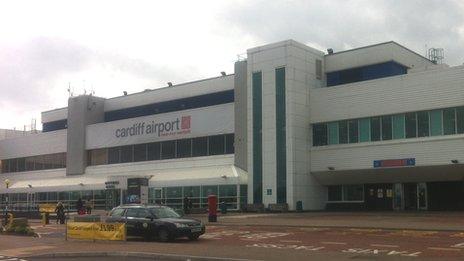Cardiff Airport: Questions over Welsh government deal value
- Published

Cardiff Airport is located about 15 miles outside Cardiff city centre
Questions have been raised about whether the Welsh government buying Cardiff Airport will make it a success.
Business leaders asked whether the deal is value for money, while rival Bristol airport wants assurances Cardiff will not receive state handouts.
An aviation expert queried if the money should be spent improving access roads.
First Minister Carwyn Jones has pledged there will be no "state aid", but says that without future investment the airport will close.
The Welsh government announced on Tuesday that it aims to buy the airport from TBI, currently owned by the Spanish company Abertis.
It will be run by an independent operator on its behalf, will not receive subsidies and should make a "return to the Welsh taxpayer" as well as the private operator, Mr Jones said.
Carwyn Jones defends the decision to buy Cardiff airport
But the Confederation of British Industry (CBI) said it would be looking "very carefully" over the coming months at whether a publicly owned Cardiff Airport would be a good thing.
The organisation's Wales director, Emma Watkins, said: "We can understand the first minister's motivation for taking this drastic step.
"The current situation simply isn't sustainable.
"Businesses want a dynamic, thriving and reinvigorated Cardiff Airport, which helps to attract inward investment and stimulate the growth the Welsh economy needs."
She added: "We are concerned that public ownership may not be a long-term solution and there are clear risks that the taxpayer could end up footing the bill if this does not work out."
Meanwhile, Robert Sinclair, chief executive officer at Bristol Airport, has questioned whether the purchase is a good use of taxpayers' money.
He said Bristol would "seek assurances" from the first minister that Cardiff Airport will be run on a commercial basis and would not receive subsidies.
"The nationalisation of Cardiff Airport certainly goes against the global trend towards privatisation and increased competition amongst airports, which is particularly the case in the UK regional market," he added.
'Compete with Bristol'
On Wednesday morning, Mr Jones told BBC Radio Wales: "It's possible to create a [business] model where there is a return to the taxpayer and, of course, a profit for a commercial operator.
"Under no circumstances will the Welsh taxpayer be asked to subsidise the operating cost of the airport."
And he went on to say neither would they be asked to fund any losses.
"This is not a vanity project," he said.
"If there is no investment in the future the airport will close."
Meanwhile, airport planning consultant Laurie Price said he is sceptical that a change of ownership at the airport will increase passenger numbers.
He said he believes it would be better to improve access to the airport which is situated at Rhoose in the Vale of Glamorgan, about a 15 mile drive from Cardiff city centre, largely along single-lane roads.
"Location and market size make an airport attractive to an airline," said Mr Price, director of aviation strategy at consultants Mott MacDonald.
"That's where Heathrow, Manchester and Birmingham do well and being at the confluence of motorways as those three airports are is helpful.
"The thing that would make a real difference for Cardiff almost overnight is if you improved its accessibility, particularly from the M4.
"And that of course immediately increases its capability to compete with Bristol."
Conservative MP Alun Cairns said there was no need for the Welsh government to buy the airport
However Peter Cole, the strategy director for Capital Region Tourism - the lead body for tourism in south east Wales - said he was "encouraged" by the Welsh government purchase.
He said it was "important" for the country to have a successful airport and that the first minister had been "working hard" with the airport management.
Plaid Cymru welcomed Tuesday's announcement and said the airport needed to be a "shopfront" for Wales, but Conservatives demanded evidence that nationalisation would provide value, and Liberal Democrats warned it would become a "money pit" for public funds.
- Published18 December 2012
- Published18 December 2012
- Published18 December 2012
- Published21 November 2012
- Published21 August 2012
- Published31 October 2012
- Published12 October 2012